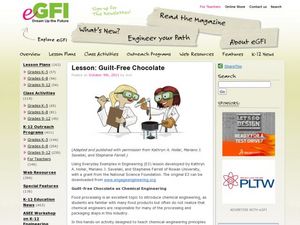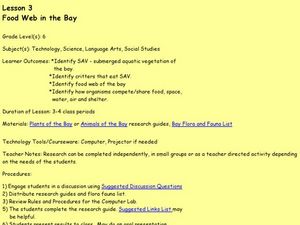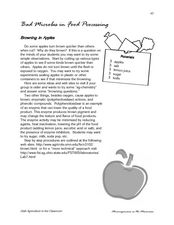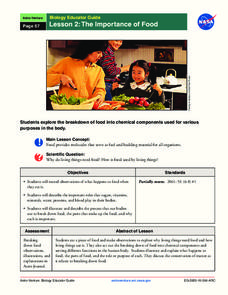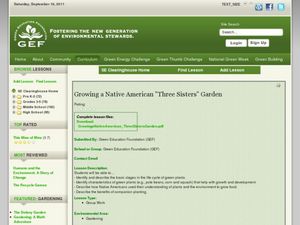Curated OER
Lesson: Guilt-Free Chocolate
Experiment with chocolate coating on cookies! What a delightful way to learn about food processing and chemical engineering. Throughout this activity, groups collect measurements and make calculations. They conclude by writing...
Baylor College
Food Webs
Explore various ecosystems from around the world as your class discovers the interdependence of all living things. Using the provided sets of ecosystem cards, young scientists work in small groups building food webs to demonstrate the...
Baylor College
What's That Food?
Get things cooking with the first lesson plan in this series on the science of food. Working in small groups, young scientists make and record observations about different mystery foods. These descriptions are then shared with the class...
Baylor College
Using Food Labels
Help your class make sense of nutrition labels with the ninth lesson of this series. After explaining the different information provided on packaged food labels, perform an activity that demonstrates the amount of sugar in a single can...
Baylor College
Food for Kids
Immediately capture the attention of your class with the smell of freshly popped popcorn in the sixth lesson of this series on the needs of living things. Young scientists first use their senses to make and record observations of...
University of Georgia
Energy Content of Foods
Why do athletes load up on carbohydrates the evening before a competition? The lesson plan helps answer this question as it relates the type of food to the amount of energy it contains. After a discussion, scholars perform an experiment...
World Wildlife Fund
Arctic Food Chain
Explore the food chains that support Arctic ecosystems. A class discussion on interdependence and the different roles plants and animals play in ecosystems provides students with the knowledge to complete a worksheet asking them to...
Curated OER
What Exactly Is Food Sovereignty?
Something is happening here, and what it is is becoming increasingly clear. Middle schoolers investigate the connections between processed foods and health issues and the movement back, especially by Native Americans, to other food choices.
Curated OER
Food for Spaceflight
When astronauts get hungry in outer space, they can't just call and have a pizza delivered. In order to gain an appreciation for the challenges associated with space travel, young learners are given the task of selecting, testing, and...
Curated OER
Food Web in the Bay
Sixth graders study the food web in a bay. In this food web lesson plan, 6th graders investigate the SAV- submerged aquatic vegetation of a bay including their predators, and how the organisms eat, have proper living space and water....
Curated OER
Bad Microbes in Food Processing
Students complete an experiment to determine if there are bad microbes in food processing.In this bad microbe experiment, students use apples to see how they react to oxygen. Students test apples with chemicals to observe the changes.
Baylor College
Healthy Snacks
Assess your pupils' ability to identify healthy food choices in the final instructional activity of this series on food science. Given five different food labels, young nutritionists will rank them from most to least healthy, supporting...
Serendip
Food, the Carbon Cycle and Global Warming
As the world population increases, demands on the carbon cycle also increase. A well-designed lesson first explores the greenhouse effect and its impact on global warming. Further sections have pupils study the effect of greenhouse gases...
NASA
The Importance of Food
Pupils make observations while eating food. They act out the process of food breaking down in the body and the roles of various chemical components, such as sugar and protein. It concludes with an activity illustrating the process and a...
Curated OER
Food Science, Scientific Method: Reliability and Validity in Empirical Research
Secondary learners explore food science by conducting an experiment using the scientific method and creating a science fair project based on their findings. They learn about food technology and modern research development. They...
Curated OER
The Quicker the Better? Food Processing
Sixth graders evaluate the nutrition of various foods. In this healthy eating lesson, 6th graders discuss the processing of many common foods and what this means. Students identify and research unfamiliar ingredients in processed foods...
Curated OER
Growing a Native American "Three Sisters" Garden
Students explore plant life by creating their own gardens in class. In this food growing lesson, students discuss the types of gardening methods Native Americans used in order to keep healthy. Students plant corn seeds in their school...
Curated OER
Genetically Modified Food (GMF)
Explore genetically modified foods through various experiments. In this biology lesson, students discuss the safety issues related to GMF's. They conduct a PCR analysis to identify the presence of genetic modification.
California Academy of Science
Rapid Brainstorming: How Can We Improve Our Global Food System?
In 2018, the average fast food burger cost $2.64 while a salad averaged $4.14. Does the price difference matter to public health? Scholars consider that question and others in a brainstorming session about improving our global food...
Serendip
Food, Energy and Body Weight
High schoolers learn why humans need calories, how they control weight with food choices, and the impact of exercise on energy. Scholars then apply their understanding to a case study of lunch choices and exercise.
Teach Engineering
Constructing Sonoran Desert Food Chains and Food Webs
Investigate desert biomes by creating food chains and food webs. Groups first research feeding habits of organisms in the Sonoran Desert. This information helps pupils draw food chains and webs to determine relationship between organisms.
Purdue University
What a Waste of Food!
Follow the life of an apple from harvest to the consumer. A three-part lesson describes the different steps to get an apple from the farmer to your kitchen and the approximate waste that happens at each step. They discuss the process and...
Serendip
Food Webs, Energy Flow, Carbon Cycle, and Trophic Pyramids
The reintroduction of a species to an area doesn't always go as expected. Scholars learn about the reintroduction of wolves into Yellowstone National Park with a video, reading, and discussion questions. They complete a hands-on activity...
One Hen
Making Choices
When choosing what foods to eat, there are a lot of factors to consider. To help make the decision a little easier, young learners work in small groups developing short plays, stories, or advertisements that address the different issues...
Other popular searches
- Food Processing Nutrients
- Clip Art Food Processing
- Microbes in Food Processing
- Food Processing Fda
- Food Processing Lesson Plan


